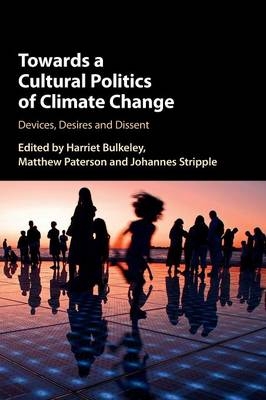
Towards a Cultural Politics of Climate Change
Cambridge University Press (Verlag)
978-1-107-16627-1 (ISBN)
Towards a Cultural Politics of Climate Change provides a new perspective on how climate change matters in policy-making, business and everyday life. It argues that the work of low carbon transitions takes place through the creation of devices, the mobilisation of desires, and the articulation of dissent. Using case studies from the US, Australia, and Europe, the book examines the creation and contestation of new forms of cultural politics - of how a climate-changed society is articulated, realized and contested. Through this approach it opens up questions about how, where and by whom climate politics is conducted and the ways in which we might respond differently to this societal challenge. This book provides a key reference point for the emerging academic community working on the cultural politics of climate change, and a means through which to engage this new area of research with the broader social sciences.
Harriet Bulkeley is a Professor of Geography at the University of Durham. Her research focuses on the processes and politics of environmental governance. Her recent books include Transnational Climate Change Governance (Cambridge, 2014), An Urban Politics of Climate Change (2015) and Accomplishing Climate Governance (Cambridge, 2016) and the edited volume Governing the Climate (Cambridge, 2015). Professor Bulkeley has undertaken commissioned research for the Joseph Rowntree Foundation, Friends of the Earth, UN-Habitat and the World Bank. In 2014, she was awarded the King Carl XVI Gustaf's Professorship in Environmental Science and a Visiting Professorship at Lund University, Sweden. Matthew Paterson is Professor of Political Science at the University of Ottawa. His research focuses on the political economy of global environmental change. His publications include Automobile Politics (Cambridge, 2007), Climate Capitalism: Global Warming and the Transformation of the Global Economy (with Peter Newell, Cambridge, 2010), and most recently Transnational Climate Change Governance (with Harriet Bulkeley and eight others, Cambridge, 2014). He has recently acted as a Lead Author for the Intergovernmental Panel on Climate Change, working on the chapter on international cooperation for their Fifth Assessment Report. His current research is focused on the political economy and cultural politics of climate change. Johannes Stripple is Associate Professor at the Department of Political Science, Lunds Universitet, Sweden. His research is concerned with the politics of climate change and its governance through a range of sites, from the insurance industry to carbon markets; from the UN to the everyday. Johannes has edited Governing the Climate (Cambridge, 2014), leads the 'ClimGovern' (FORMAS) research project and convenes the 'Pufendorf Decarbonisation Laboratory'. In 2014, he was awarded 'outstanding achievement for Lund University' for his work establishing a clean-tech centre of excellence in Botswana.
Preface; 1. Introduction Harriet Bulkeley, Matthew Paterson and Johannes Stripple; 2. CHANGE: The European Commission's climate campaign as a technique of government Ylva Uggla and Fredrika Uggla; 3. Devising low-carbon desires in the Australian urban economy Robyn Dowling, Pauline McGuirk, Harriet Bulkeley and Clare Brennan; 4. Low-carbon devices and desires in community housing retrofit Andrew Karvonen; 5. Caring for the low-carbon self: the government of self and others in the world as a gas greenhouse Timothy Luke; 6. Grief, loss and the cultural politics of climate change Lesley Head; 7. Culture, technology, and transport: navigating a path to low-carbon urban mobilities in the United States Hugh Bartling; 8. 'The everyday choices we make matter': urban climate politics and the postpolitics of responsibility and action Jennifer L. Rice; 9. Strategic engagements with resistance against energy efficient devices: exploring the hidden politics of comfort desires in housing Maj-Britt Quitzau and Birgitte Hoffmann; 10. The directionality of desire in the economy of qualities: the case of retailers, refrigeration and reconstituted orange juice Josephine Mylan; 11. The making of a zero-carbon home Heather Lovell; 12. Wind power activism: epistemic struggles in the formation of eco-ethical selves at Vattenfall Annika Skoglund and Steffen Böhm; 13. Conclusions Harriet Bulkeley, Matthew Paterson and Johannes Stripple; Index.
| Erscheinungsdatum | 04.10.2016 |
|---|---|
| Zusatzinfo | 3 Tables, black and white; 8 Halftones, black and white |
| Verlagsort | Cambridge |
| Sprache | englisch |
| Maße | 225 x 225 mm |
| Gewicht | 600 g |
| Themenwelt | Naturwissenschaften ► Biologie ► Ökologie / Naturschutz |
| Naturwissenschaften ► Geowissenschaften ► Meteorologie / Klimatologie | |
| Recht / Steuern ► EU / Internationales Recht | |
| Sozialwissenschaften ► Politik / Verwaltung ► Vergleichende Politikwissenschaften | |
| Technik ► Umwelttechnik / Biotechnologie | |
| Wirtschaft ► Volkswirtschaftslehre | |
| ISBN-10 | 1-107-16627-6 / 1107166276 |
| ISBN-13 | 978-1-107-16627-1 / 9781107166271 |
| Zustand | Neuware |
| Haben Sie eine Frage zum Produkt? |
aus dem Bereich


